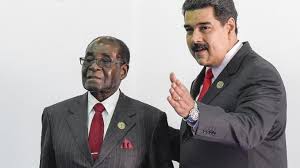September 6, 2019
By Stephen Gowans
It seemed almost inevitable six years ago that on the day Western newspapers were filled with encomia to the recently deceased South African national liberation hero, Nelson Mandela, that another southern African hero of national liberation, Robert Mugabe, would be vilified. “Nearly 90, Mugabe still driving Zimbabwe’s economy into the ground,” complained one Western newspaper.
 Mandela and Mugabe were key figures in the liberation of black southern Africa from white rule. So why did the West overflow with hosannas for Mandela and revile Mugabe? Why was Mandela the ‘good’ national liberation hero and Mugabe the ‘bad’?
Mandela and Mugabe were key figures in the liberation of black southern Africa from white rule. So why did the West overflow with hosannas for Mandela and revile Mugabe? Why was Mandela the ‘good’ national liberation hero and Mugabe the ‘bad’?
A lot of it had to do with the extent to which the liberation projects in South Africa and Zimbabwe threatened or didn’t threaten white and Western economic interests—hardly at all in Mandela’s South Africa and considerably in Mugabe’s Zimbabwe.
The media-propagated narrative was that Mandela was good because he was ‘democratic’ and Mugabe was bad because he was ‘autocratic.’ But scratch the surface and Western and white-elite economic interests burst forth.
Land ownership in South Africa continues to be dominated by the white minority, just as it was under apartheid. What land redistribution has occurred has proceeded at a glacial pace, at best. In Zimbabwe, in contrast, land was redistributed from white colonial settlers and their descendants to the black majority. South Africa’s economy is white- and Western-dominated. Under Mugabe, Zimbabwe was taking steps to indigenize its economy, placing majority control of the country’s natural wealth and productive assets in the hands of its indigenous people.
The centrality of economic interests in the Western demonization of Mugabe was revealed in complaints about his plan to indigenize Western-owned mining companies, a process which would force a few wealthy investors in the West to surrender a majority stake in the mining of Zimbabwe’s mineral wealth. To the Western media, an African government giving its people an ownership stake in their own economy was unthinkable.
Mandela, in contrast, rejected calls to nationalize South Africa’s mines, accepting Western and white domination of the country’s economy as a bedrock principle of sound economic management.
In 2013, The Financial Times celebrated the South African leader for acting as “a reliable steward of sub-Sahara Africa’s largest economy, embracing orthodox fiscal and monetary policies.” That is, Mandela made sure that the flow of profits from South African mines and agriculture into the coffers of foreign investors and the white business elite wasn’t interrupted by the implementation of the ANC’s economic justice program, which called for nationalizing the mines and redistributing land. Nationalization, and redistribution of land, would become the sole project of Mugabe.
But at one point, Mugabe too was a Western-approved liberation hero, in the days when he shared Mandela’s predilection for orthodox fiscal and monetary policy, that is, putting Western business interests ahead of those of the people he was supposed to represent.
But the West’s love affair with Mugabe came to an abrupt end when the Zimbabwean president changed course and embarked on a fast-track land reform program. The West’s disdain for him deepened when he launched an indigenization program to place majority control of the country’s mineral resources in the hands of indigenous Zimbabweans.
Hence, Mugabe’s transition from ‘good’ liberation hero to ‘bad’, from saint to demon, coincided with his transition from “reliable steward” of Zimbabwe’s economy (that is, reliable steward of foreign investor and white colonial settler interests) to promoter of indigenous economic interests. And as he moved to invest Zimbabwe’s liberation project with real meaning, giving Zimbabweans both political and economic sovereignty, the West responded with sanctions aimed at starving the country to force it to reverse course. “When a colonial and imperialist power is forced to give independence to a people,” remarked Frantz Fanon, the “imperialist power says: ‘you want independence? Then take it and die of hunger.’”
As the West’s campaign of economic warfare plunged Zimbabwe’s economy into chaos, Western journalists attributed the country’s economic difficulties to what they called Mugabe’s ‘mismanagement’, overlooking Washington’s Zimbabwe Democracy and Economic Recovery Act, which blocked financial assistance to Harare from international lending institutions, a major impediment to the country’s economic development. It’s as if the Soviet Union’s crippled post-WWII economy had been blamed on socialism, rather than the destruction wrought by war and the Nazi invasion. In this, Western media followed their standard operating procedure in dealing with pro-independence Third World governments, attributing a sanctioned country’s economic difficulties to mismanagement and not the sanctions that caused them. The practice is evident today in connection with Venezuela, where the oil-rich country’s economic distress is discussed in Western media with a studious disregard of Washington’s detonation of an economic atom bomb in the middle of Caracas in the form of a program of economic warfare.
As to the democrat vs. autocrat dichotomy, it was a propaganda contrivance. It’s what Western governments and media use to legitimize leaders who protect and promote Western corporate interests and demonize leaders (from Castro to Kim Jong Un to Maduro to Xi Jinping to Mugabe) who protect and promote the interests and development needs of their own people.
We can argue about whether Mugabe failed to calibrate the pace of his land reform and economic indigenization programs to take account of the power of Western governments to counter them, but we can’t argue about whether he was a genuine hero of national liberation—one who recognized that a country whose economy is controlled by outsiders and a settler minority is independent in name alone.